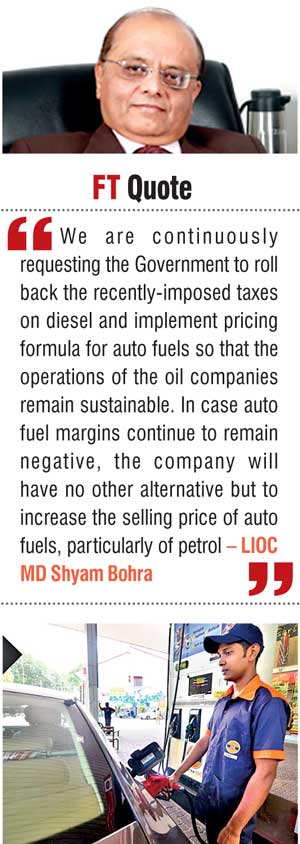Monday Feb 23, 2026
Monday Feb 23, 2026
Saturday, 13 May 2017 00:15 - - {{hitsCtrl.values.hits}}
Lanka IOC has recorded a loss of Rs. 652 million in the fourth quarter compared to a profit of Rs. 1.56 billion a year earlier but managed to achieve improved results for the full financial year of 2016/17.
Profit achieved in FY17 was Rs. 3 billion, up from Rs. 2.2 billion in FY16.
LIOC said the loss in the 4th quarter was mainly on account of losses incurred on sale of petrol and diesel.
“Due to steep increase in prices of petrol and diesel in the international market, coupled with significant increase in taxes and depreciation of rupee, the margins on petrol and diesel have become negative,” the company said in a statement.
The retail selling prices were last revised in January 2015.
Since then, the USD/LKR exchange rate has increased from 131.93 to 151.74 as on 31 March and this huge impact has not been passed in retail selling prices. Similarly, taxes have been increased drastically on both petrol and diesel and these significant higher taxes have not been passed on to customers through higher retail selling prices. For some time, margins on diesel compensated the loss in petrol, but now both the products are making losses.
LIOC said the current quarter of the financial year 2017/18 will be a big challenge for the company since landed cost of petrol and diesel is much higher than the prevailing retail selling prices in the market and more than 75% of its turnover is derived from auto fuel segment.
In spite of continuous losses, LIOC has continued to sell the products from its retail outlets, in fact more than the industry average.
Against industry growth of 9%, LIOC sales growth was 17% during 2016/17 in the auto fuel segment. LIOC also witnessed good increase in volumes in lubes and bitumen segments despite tough competition and entry of new players. LIOC has spent major capex at refurbishment of facilities at retail outlets and maintenance of infrastructure at Trincomalee Tank Farm.
“At present, we are continuously selling our auto fuel products with negative margins. Even though currently having red mark in auto fuel, we could report profit for the financial year 2016/17, mainly due to the positive margins in diesel in the beginning of the year and pleasing performance of our other business segments,” LIOC Managing Director Shyam Bohra said in the statement.
“We are continuously requesting the Government to roll back the recently-imposed taxes on diesel and implement pricing formula for the auto fuels so that the operations of the oil companies remain sustainable. In case auto fuel margins continue to remain negative, the company will have no other alternative but to increase the selling price of auto fuels, particularly of petrol,” Bohra added.